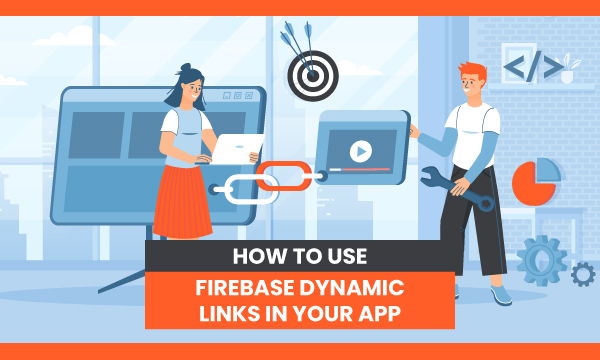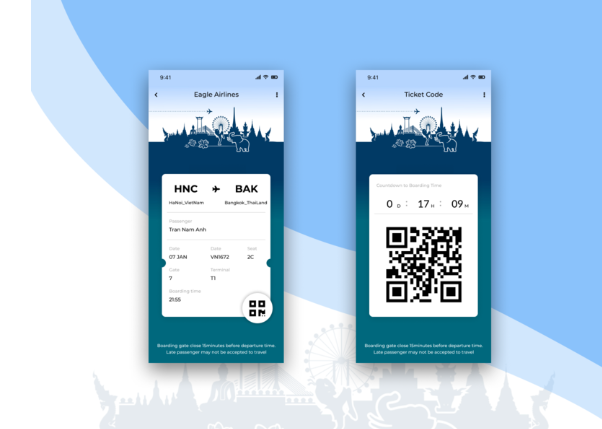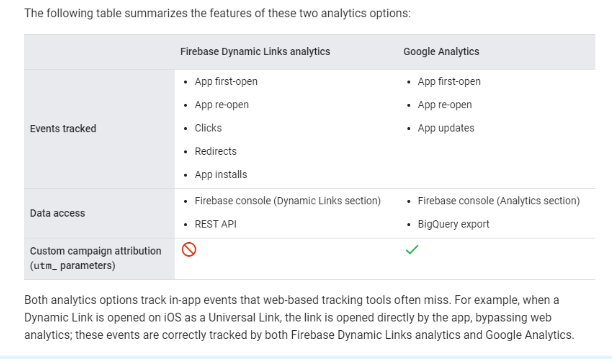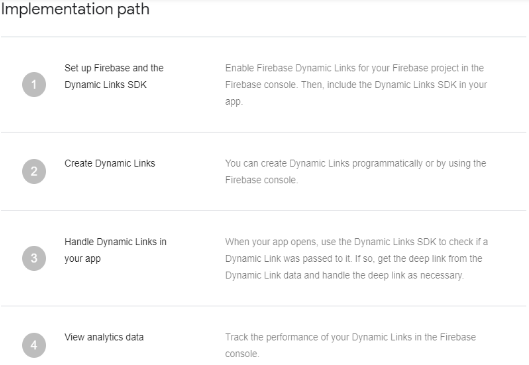
Are you a marketer working for a client or company with an app?
If you answered yes to this question, do you have a dedicated strategy for driving website visitors to specific locations within the app?
If you don’t have one, this blog is for you.
If you do have a strategy involving deep linking, this blog is also for you.
Read on to learn how Firebase Dynamic Links can help marketers achieve their app goals while boosting overall marketing strategy.
What Are Firebase Dynamic Links?
Before we dive into Firebase Dynamic Links, let’s talk about deep linking: a strategy allowing a single URL to drive traffic to a particular app location. While this may sound ideal in theory, in practice, deep linking can result in a lack of cohesion between iOS and Android apps, broken links, and other headaches.
Firebase Dynamic Links, however, help control where a user lands with much more precision than deep links. With Firebase Dynamic Links, you can direct users to an IOS or Android app or the appropriate mobile store listing. In addition, given the dynamic nature of these links, when a user opens the app for the first time, you can retrieve the deep link URL that drove them to the app.
How Do Firebase Dynamic Links Work?
Dynamic Links are smart URLs that send users anywhere within an app. They even allow new users to immediately see the content they were initially searching for after installing the app.
How Firebase Dynamic Links Can Help Your Marketing Strategy
While the links primarily drive users to their intended locations within your app, Firebase Dynamic Links also benefit marketers.
Below, we break down six ways Firebase Dynamic Links can help your marketing strategy.
Convert Site Users to App Users
If you’re trying to market an app, you’re dreaming of driving downloads. With Firebase Dynamic Links, a web user can jump from site to app seamlessly.
Imagine, for example, a web user is listening to a music player on their web browser and decides to install the app. With Firebase Dynamic Links, they can navigate to the app store, download the app, and resume listening to the original song on the app.
Pretty cool, right?
This seamless transition from website to app can eliminate distraction and improve user experience.
Omnichannel Campaigns
Omnichannel marketing campaigns employ a variety of channel strategies, including social, email, and others.
By using Firebase Dynamic Links, you can improve your marketing campaigns across all channels. Here’s how:
Social Campaigns
If you’re running a social campaign featuring an in-app discount, Firebase Dynamic Links lets users move seamlessly from social channels to the offer within the app. They can even download the app along the way.
Email Campaigns
Much like with social campaigns, try crafting a well-designed email with Firebase Dynamic Links to drive to your app. Regardless of whether recipients have already downloaded your app or not, the link will still ultimately take them to their desired location.
SMS Marketing Campaigns
Much like email and social, consider offering a discount through SMS via a Firebase Dynamic Link. Again, you can drive users to a specific location without losing them along the way, improving the experience and increasing the likelihood of the desired action.
Allow Users to Share Your App Content
Make sharing content from your app easy with Firebase Dynamic Links. You can offer personalized content when the app is first opened, building a more robust connection and ideally solidifying the opener as a user.
Convert Desktop Visitors to App Users
With Firebase Dynamic Links, you can help users migrate from your desktop site to your app by allowing them to send themselves a deep link. Then, when they click the link on their mobile device, it sends them to the correct location in the app, even if they have to install it first.
Improve In-Person Promotions for Your App
Out-of-home (OOH) advertising still has a massive impact on consumers. Consider using a QR code with your Firebase Dynamic Link in physical displays like billboards, subway advertisements, flyers, or benches.

Gain Better Analytics Visibility
As a marketer, you know the value of analytics. With the unique tracking abilities of Firebase Dynamic Links, you can measure and attribute your campaigns by appending your links with urchin tracking model (UTM) parameters.
By enabling conversions in the associated analytics tool, you can track the success of links by measuring in-app events and revenue. The events tracked can include:
- app first-open
- app-reopen
- sign-ups
- add to wishlist
- add to cart
- purchases
The analytics tool lets retailers assess the performance of their campaigns, which helps marketers make smarter decisions.

How to Create Firebase Dynamic Links
You can create Firebase Dynamic Links using your own domain name or a free custom page.link subdomain. The implementation path for Firebase Dynamic Links is laid out on their site:

Firebase Dynamic Links Frequently Asked Questions
What are Firebase Dynamic Links?
With Firebase Dynamic Links, you can direct users to either an IOS or Android app from a page, email, or text. If they don’t have the app installed, these links can drive users to the appropriate mobile store listing.
These links can persist beyond installation, meaning when a user opens the app for the first time, you can retrieve the deep link URL that drove the user to the app originally.
Should marketers use Firebase Dynamic Links?
Yes, marketers should take advantage of Firebase Dynamic Links. Not only can these links improve UX by making navigating to a desired location within an app easier, but they also increase the likelihood of achieving your app marketing campaign goal.
How do you track Firebase Dynamic Links?
You track Firebase Dynamic Links within the relevant section of the Firebase console. It also integrates with Google Analytics.
Are Firebase Dynamic Links free?
Yes, Firebase Dynamic links are free.
How do Firebase Dynamic Links work?
Dynamic Links are smart URLs able to send existing and potential users anywhere within an app. New users can see the content they were initially searching for after installing and opening the app.
Firebase Dynamic Links Conclusion
For the savvy marketer, looking for tools to help make your campaign goals a reality is necessary. As the way consumers search evolves, so do their expectations for what their experiences should be.
When you employ a tool like Firebase Dynamic Links, you ensure potential app downloaders not only experience a frictionless transition from mobile or desktop to your app, with the screen immediately showing exactly what they were looking for.
This ease of movement also increases the likelihood that those who download your app will keep it. By ensuring every step of the process is simple and drives users to the correct location, you become more likely to retain the users you attracted.
What’s the best use of Firebase Dynamic links in marketing material you’ve seen?
from Blog – Neil Patel https://ift.tt/3Awk6aG
via IFTTT
No comments:
Post a Comment